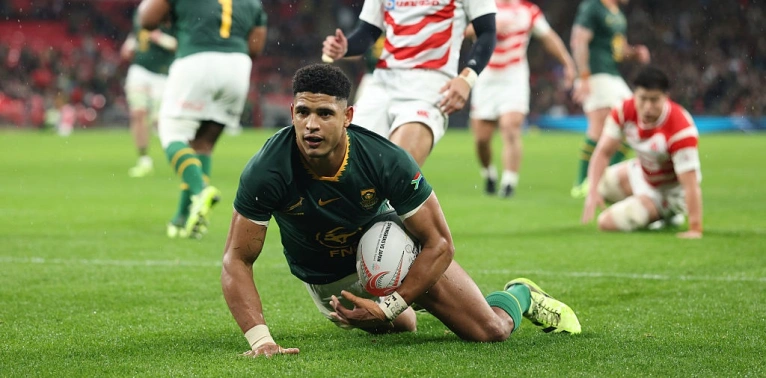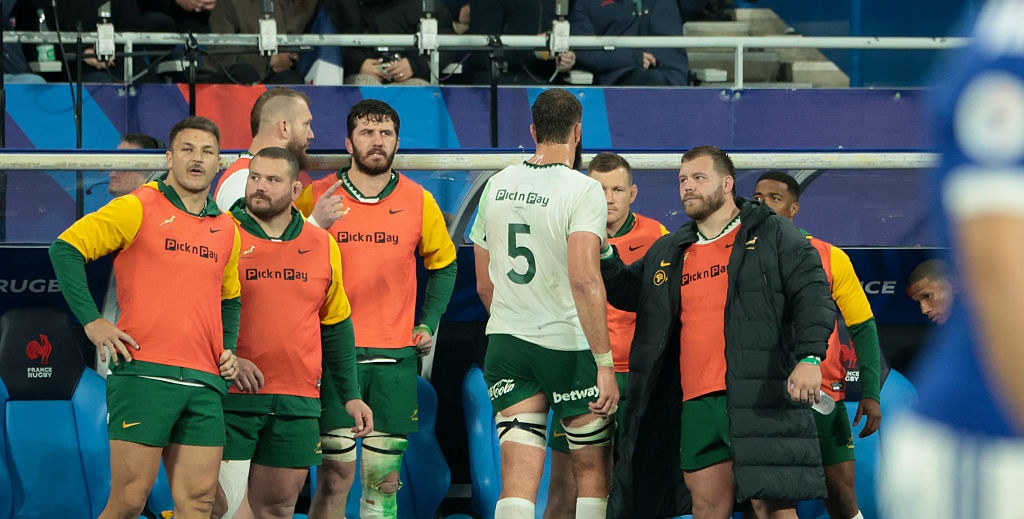It is becoming increasingly difficult to cover the Springboks as a columnist. In this business, originality is key, but the continued excellence of Rassie Erasmus’ team is rendering this task almost impossible.
How many different ways can one eulogise a team that is now, unquestionably, the best in the world – one that has opened up a gaping chasm between themselves and the chasing pack? How many unique ways can one wax lyrical about their bench strength, the extra bows in their attack, the indomitability of their defence, their ability to blood new talent, and the ways in which they have leveraged their wider social significance to find extra gears on the pitch?
Even when Erasmus and Siya Kolisi were speaking after their 32-17 comeback win against France in a frothing, hostile stadium, they covered old ground. Familiar notes were hit as if the Boks have now become a tribute act to themselves.
There were platitudes about the differences between the pressures of living with an empty stomach compared with the privileges of wearing the Springboks jersey. There were the usual lines about self-sacrifice and the higher sense of purpose they carry. Both coach and captain wheeled out the frequently heard yarns about the squad’s collective might, thanking the players who were not part of the match-day 23 but who shaped the build-up during the week.
One of those players is Handré Pollard, the only fly-half in the sport’s history to have heard the final whistle of two triumphant World Cup campaigns. He is 31 and theoretically in the prime of his career, yet he can’t buy a game. No other team on the planet, perhaps no other team that has ever come before, could conceive of such a scenario.

Italy

South Africa
Did New Zealand ever consider dropping Dan Carter? Did England ever consider omitting Jonny Wilkinson? Did Barry John ever carry tackle bags during his peak years? It’s easy to take Pollard’s selflessness for granted, to skirt over the fact that he was a spectator for the wins over France, New Zealand and Argentina. But this is not normal. Treating a perennial champion like a nice-to-have commodity is not the done thing. This team has normalised the unthinkable.
Take Kolisi’s contributions this Saturday. He entered the Stade de France like a demigod, shrouded in a single spotlight and bathed in the glow of dozens of exploding fireworks. He ran onto the pitch by himself, pointing to the heavens as French and South African supporters chanted his name. And yet he was hooked at halftime on the occasion of his 100th Test.
This is Siya Kolisi we’re talking about. A man who has transcended the game of rugby, who has transcended sport itself. A man who is spoken about in the same breath as Nelson Mandela without any hyperbole. It’s not normal to treat him like just another cog in the machine.
Would Richie McCaw have been treated the same in his 100th Test? Would any coach have had the bravery to tap Brian O’Driscoll on the shoulder and tell him his centenary game was being cut short? Maybe, maybe not. It’s immaterial. The point is the Springboks are doing things that are taking the game to a higher echelon and the rest of us are almost becoming numb to it.
In the most competitive era – where sober pundits can make a case that Scotland can beat New Zealand, where a mediocre Australia can still claim a win over the British & Irish Lions, where Fiji come within a few points of a World Cup semi-final – rugby’s leading team are getting better.
 Sacha Feinberg-Mngomezulu of South Africa scores his team’s second try during the Autumn Nations Series 2025 match between South Africa and Japan at Wembley Stadium on November 01, 2025 in London, England. (Photo by Luke Walker/Getty Images)
Sacha Feinberg-Mngomezulu of South Africa scores his team’s second try during the Autumn Nations Series 2025 match between South Africa and Japan at Wembley Stadium on November 01, 2025 in London, England. (Photo by Luke Walker/Getty Images)
Because let’s be blunt: no other side at present would have beaten France on Saturday. To lose a lock to a red card in the first half, to come back from 14-6 down having shipped two early tries, to face the thunder of a French team hellbent on revenge and still emerge not just unscathed but triumphant, required something beyond tactical mastery. It demanded an emotional resilience that has become the defining trait of this team.
There was truly never a stage in the game where the Boks felt defeated. There was never a moment of panic. In fact, under Erasmus, panic has been surgically removed from the Springbok psyche. There is a calm that borders on arrogance, a trust in the system, an innate belief that someone will step up and get the job done.
That belief materialised again. Malcolm Marx and Pieter-Steph du Toit were characteristically immense. Jasper Wiese carried like a freight train. Grant Williams brought a jolt of electricity when he came on, his sniping runs puncturing the fatigue that had begun to seep into both sides. Even Sacha Feinberg-Mngomezulu, after a ropey start at fly-half, looked born to it when he moved to fullback as the game fractured.
This is the evolution of Erasmus’s empire. The first iteration, in 2019, was built on redemption and collective catharsis. The second, in 2023, on clinical precision and tournament savvy. This 2025 version feels different again: looser, more expansive, more confident in chaos.
And so we circle back to the problem of writing about them. What more is there to say when the extraordinary becomes the norm? When resilience is not a talking point but a default setting? It’s tempting to reach for the usual adjectives – relentless, ruthless, composed – but those words have been blunted by repetition.
The Springboks have transcended narrative. They are what happens when excellence is systemised, when emotion and precision coexist, when a jersey carries the weight of a nation and somehow turns it into energy.
We can keep trying to find new metaphors, new ways to describe the same phenomenon. Or we can simply accept that this is rugby’s immutable truth: the Springboks are not just ahead of the chasing pack – they are redefining what the summit looks like.

